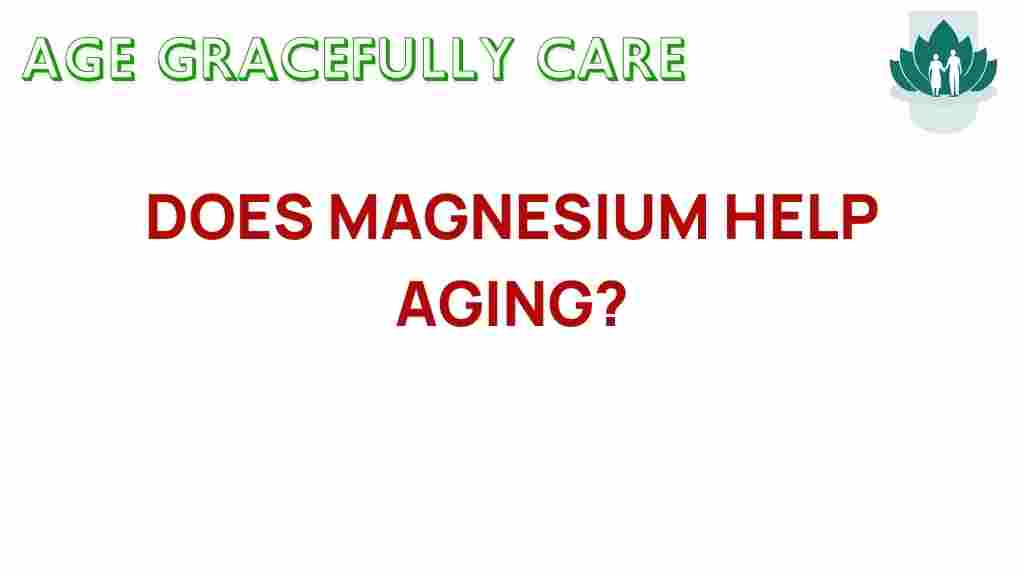Unraveling the Mystery: Does Magnesium Hold the Key to Aging?
The quest for longevity and vitality is an age-old pursuit that many have embarked upon. With a myriad of supplements, diets, and wellness strategies available, magnesium has emerged as a significant player in the conversation surrounding aging and health. This essential mineral plays a pivotal role in numerous bodily functions, and its potential impact on aging is garnering increasing attention from researchers and health enthusiasts alike. In this article, we will delve into the relationship between magnesium, aging, and overall wellness, exploring its benefits, sources, and supplementation strategies.
The Role of Magnesium in the Body
Magnesium is a crucial mineral that participates in over 300 biochemical reactions in the body. It is essential for:
- Energy production: Magnesium aids in converting food into energy, helping to maintain vitality.
- Bone health: It works alongside calcium to build and maintain strong bones.
- Nerve function: Magnesium is vital for proper nerve transmission and muscle function.
- Heart health: It helps regulate heart rhythm and blood pressure.
- DNA synthesis: Magnesium is involved in the synthesis and repair of DNA, which is critical for cellular health.
Clearly, magnesium is integral to health, but how does it relate to aging?
Understanding Aging: The Biological Perspective
Aging is a complex biological process influenced by various factors including genetics, environment, and lifestyle. As we age, our bodies undergo several changes:
- **Decreased cellular function:** Cells may not replicate as efficiently, leading to age-related diseases.
- **Increased inflammation:** Chronic low-level inflammation, known as “inflammaging,” can lead to various health issues.
- **Oxidative stress:** The accumulation of free radicals can damage cells and contribute to aging.
These changes can lead to a decline in vitality and an increase in health issues. Emerging research suggests that adequate magnesium levels may help mitigate some of these aging-related changes.
Magnesium and Aging: What Research Shows
Numerous studies have indicated a correlation between magnesium levels and various aspects of health as we age. Here are some key findings:
- Bone Density: Research shows that magnesium plays a significant role in maintaining bone density. Low magnesium levels are associated with an increased risk of osteoporosis.
- Heart Health: Magnesium supports cardiovascular health, and its deficiency is linked to an increased risk of heart disease, particularly in older adults.
- Cognitive Function: Some studies suggest that adequate magnesium intake may help protect against cognitive decline and neurodegenerative diseases.
- Inflammation Reduction: Magnesium has anti-inflammatory properties that may help reduce chronic inflammation associated with aging.
These findings support the idea that magnesium could indeed hold the key to enhancing health and wellness as we age.
Sources of Magnesium: Nutrition and Supplements
To harness the potential benefits of magnesium for aging, it is essential to incorporate magnesium-rich foods into your diet. Some excellent sources of magnesium include:
- **Leafy greens:** Spinach, kale, and Swiss chard are all rich in magnesium.
- **Nuts and seeds:** Almonds, cashews, and pumpkin seeds are great options.
- **Whole grains:** Brown rice, quinoa, and whole wheat bread provide significant amounts of magnesium.
- **Legumes:** Beans, lentils, and chickpeas are excellent sources.
- **Fish:** Fatty fish such as salmon and mackerel offer not only magnesium but also omega-3 fatty acids.
In addition to dietary sources, magnesium supplements can also be considered, especially for individuals who may not get enough from their diet. It’s crucial to consult a healthcare provider before starting any supplementation to determine the appropriate dosage and form, as magnesium is available in various forms, such as magnesium citrate, oxide, and glycinate.
Step-by-Step Guide to Optimizing Magnesium Intake
To ensure you are getting enough magnesium for optimal health and longevity, follow these steps:
- Assess Your Diet: Take note of your current dietary habits and identify magnesium-rich foods you may be missing.
- Incorporate More Magnesium-Rich Foods: Aim to include at least a few servings of magnesium-rich foods daily.
- Consider Supplements: If you find it challenging to meet your magnesium needs through food alone, discuss supplementation options with your healthcare provider.
- Monitor Your Health: Keep track of your health markers, particularly those related to bone density, heart health, and cognitive function.
- Stay Informed: Keep up with the latest research on magnesium and aging to adjust your approach as new information becomes available.
Troubleshooting Magnesium Deficiency
Despite efforts to optimize magnesium intake, some individuals may still experience deficiency. Here are common symptoms of magnesium deficiency to watch for:
- **Muscle cramps or spasms:** Frequent muscle cramps can indicate low magnesium levels.
- **Fatigue:** Persistent tiredness may be a sign of inadequate magnesium intake.
- **Mental health issues:** Anxiety, depression, and irritability can be linked to magnesium deficiency.
- **Irregular heart rhythms:** This is a more serious symptom that warrants immediate medical attention.
If you suspect a magnesium deficiency, it’s essential to consult with a healthcare professional who can perform blood tests and recommend appropriate dietary changes or supplements.
Conclusion: The Role of Magnesium in Longevity
As we continue to explore the mysteries of aging, magnesium emerges as a vital mineral that could play a significant role in enhancing health and wellness. Through its impact on cellular function, inflammation, and overall vitality, maintaining adequate magnesium levels may help promote longevity and reduce the risk of age-related diseases.
By incorporating magnesium-rich foods into your diet and considering supplementation when necessary, you can take proactive steps toward optimizing your health as you age. Remember, it’s always best to consult with a healthcare provider to tailor a plan that suits your individual needs.
To further your knowledge on nutrition and wellness, consider exploring more about essential minerals and their impact on health. For further reading on longevity strategies, check out this comprehensive guide.
In conclusion, magnesium may indeed hold the key to not only a longer life but a healthier, more vibrant one as well. Embrace the power of this essential mineral and unlock your potential for longevity.
This article is in the category Health and created by AgeGracefullyCare Team
